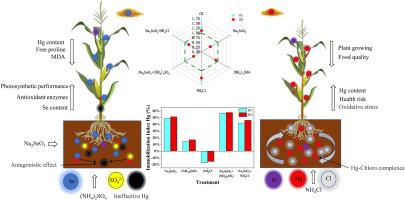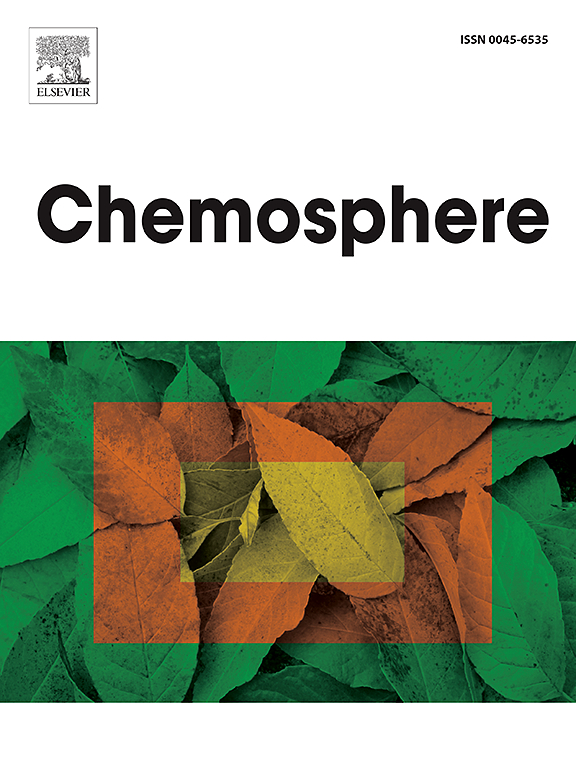两种灌溉条件下联合施用硒肥和铵肥对汞污染土壤中玉米生长和营养质量的影响及其健康风险评估
IF 8.1
2区 环境科学与生态学
Q1 ENVIRONMENTAL SCIENCES
引用次数: 0
摘要
研究了在不同水质条件下,Se(Na2SeO3)和铵肥((NH4)2SO4 和 NH4Cl)对汞(Hg)污染土壤中玉米(Zea mays L.)的生长和质量的交互作用。该研究确定了两种营养源(Se 和 NH4+-N)如何相互作用,以提高玉米的产量、质量和安全性,从而确保重金属汞胁迫下的粮食安全和质量保证。试验在两种灌溉条件下进行:W1(完全灌溉条件,持水量的 60-70%)和 W2(限制灌溉条件,持水量的 40-50%)。硒肥和铵肥的联合施用显著改善了汞污染土壤中玉米的生长和谷物的品质。当 Na2SeO3 和 (NH4)2SO4 混合施用时,玉米的生长和品质在所有处理中提高得最快。Na2SeO3 与铵肥的交互作用显著影响了土壤中可利用的汞/甲基汞(MeHg)含量和玉米中的汞/甲基汞浓度。NH4Cl 能明显增加土壤中可利用的汞/甲基汞的含量,并由于 Cl- 的作用增加了汞/甲基汞在玉米组织中的积累。然而,含有 Na2SeO3 或 (NH4)2SO4 的处理方法能明显降低土壤中可利用的 Hg/MeHg 含量,减少 Hg/MeHg 在玉米组织中的积累,显著降低可能对人类健康造成的危害。含有 Na2SeO3 或 (NH4)2SO4 的处理可通过增加玉米组织中的 Se 含量和减少 Hg/MeHg 含量促进玉米生长,缓解 Hg 引起的胁迫,并增加养分含量。在本实验中,Na2SeO3 和 (NH4)2SO4 的组合处理效果最好。这项研究还表明,这种策略有助于减少消费者因食用玉米及其衍生物而积累汞/甲基汞的机会,从而确保食品安全。在汞污染地区,硒和铵肥可共同用于提高玉米产量和发展农业生产,这可能会对全球粮食生产产生重大影响。此外,这种简单的方法还能帮助农民管理受重金属污染影响的土壤。本文章由计算机程序翻译,如有差异,请以英文原文为准。

Effects of combined application of Se and ammonium fertilizers on the growth and nutritional quality of maize in Hg-polluted soil under two irrigation conditions and its health risk assessment
The interactive effects of Se (Na2SeO3) and ammonium fertilizers ((NH4)2SO4 and NH4Cl) on the growth and quality of maize (Zea mays L.) in mercury (Hg)-contaminated soil were studied under different water conditions. This study determined how two nutrient sources (Se and NH4+-N) interacted to improve the yield, quality, and safety of maize to ensure food security and quality assurance under the stress of heavy metal Hg. The experiment was conducted under two irrigation conditions: W1 (complete irrigation condition, 60–70% of water-holding capacity) and W2 (restricted irrigation condition, 40–50% of water-holding capacity). The combined treatment of Se and ammonium fertilizers significantly improved the growth of maize and the quality of grain in Hg-polluted soil. When Na2SeO3 and (NH4)2SO4 were combined, the growth and quality of maize increased the highest among all treatments. The interaction between Na2SeO3 and ammonium fertilizers significantly affected the available Hg/methylmercury (MeHg) content in soil and the Hg/MeHg concentration in maize. NH4Cl significantly increased the content of available Hg/MeHg in soil and increased the accumulation of Hg/MeHg in maize tissues due to Cl−. However, the treatments containing Na2SeO3 or (NH4)2SO4 significantly reduced the content of available Hg/MeHg in soil, reduced the accumulation of Hg/MeHg in maize tissues, and significantly reduced the possible health risks to human beings. The treatments containing Na2SeO3 or (NH4)2SO4 promoted maize growth by increasing the Se content in maize tissues and reducing the Hg/MeHg content, relieving the stress induced by Hg, and increasing the nutrient content. The combined treatment of Na2SeO3 and (NH4)2SO4 had the best effect in this experiment. This study also showed that this strategy is helpful in reducing the opportunities for consumers to accumulate Hg/MeHg by eating maize and its derivatives, thus ensuring food safety. Se and ammonium fertilizer can be used together to increase maize yield and develop agricultural production in Hg-polluted areas, which may have a significant impact on global food production. In addition, this simple method can help farmers manage soil affected by heavy metal pollution.
求助全文
通过发布文献求助,成功后即可免费获取论文全文。
去求助
来源期刊

Chemosphere
环境科学-环境科学
CiteScore
15.80
自引率
8.00%
发文量
4975
审稿时长
3.4 months
期刊介绍:
Chemosphere, being an international multidisciplinary journal, is dedicated to publishing original communications and review articles on chemicals in the environment. The scope covers a wide range of topics, including the identification, quantification, behavior, fate, toxicology, treatment, and remediation of chemicals in the bio-, hydro-, litho-, and atmosphere, ensuring the broad dissemination of research in this field.
 求助内容:
求助内容: 应助结果提醒方式:
应助结果提醒方式:


